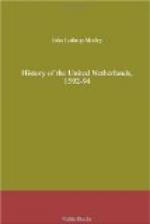Now he was chief of the “Politicians,” and sworn supporter of the Council of Trent. Earnest Huguenots were hanging their heads in despair.
He represented the principle of national unity against national dismemberment by domestiv, treason and foreign violence. Had that principle been his real inspiration, as it was in truth his sole support, history might judge him more leniently. Had he relied upon it entirely it might have been strong enough to restore him to the throne of his ancestors, without the famous religious apostacy with which his name is for ever associated. It is by no means certain that permanent religious toleration might not have been the result of his mounting the throne, only when he could do so without renouncing the faith of his fathers. A day of civilization may come perhaps, sooner or later, when it will be of no earthly cousequence to their fellow creatures to what creed, what Christian church, what religious dogma kings or humbler individuals may be partial; when the relations between man and his Maker shall be undefiled by political or social intrusion. But the day will never come when it will be otherwise than damaging to public morality and humiliating to human dignity to forswear principle for a price, and to make the most awful of mysteries the subject of political legerdemain and theatrical buffoonery.
The so-called conversion of the king marks an epoch in human history. It strengthened the Roman Church and gave it an indefinite renewal of life; but it sapped the foundations of religious faith. The appearance of Henry the Huguenot as the champion of the Council of Trent was of itself too biting an epigram not to be extensively destructive. Whether for good or ill, religion was fast ceasing to be the mainspring of political combinations, the motive of great wars and national convulsions. The age of religion was to be succeeded by the age of commerce.
But the king was now on his throne. All Paris was in rapture. There was Te Deum with high mass in Notre Dame, and the populace was howling itself hoarse with rapture in honour of him so lately the object of the general curse. Even the Sorbonne declared in favour of the reclaimed heretic, and the decision of those sages had vast influence with less enlightened mortals. There was nothing left for the Duke of Feria but to take himself off and make Latin orations in favour of the Infanta elsewhere, if fit audience elsewhere could be found. A week after the entrance of Henry, the Spanish garrison accordingly was allowed to leave Paris with the honours of war.
“We marched out at 2 P.M.,” wrote the duke to his master, “with closed ranks, colours displayed, and drums beating. First came the Italians and then the Spaniards, in the midst of whom was myself on horseback, with the Walloons marching near me. The Prince of Bearne”—it was a solace to the duke’s heart, of which he never could be deprived, to call the king by that title—“was at a window over the gate of St. Denis through which we took our departure. He was dressed in light grey, with a black hat surmounted by a great white feather. Our displayed standards rendered him no courteous salute as we passed.”




